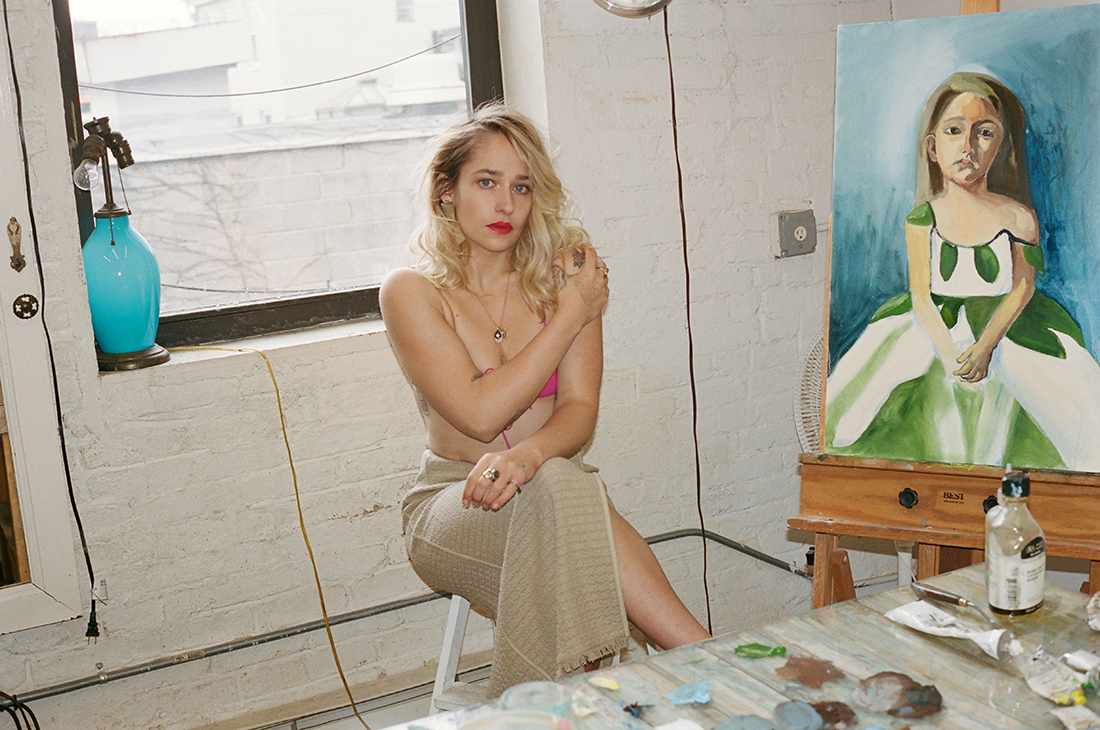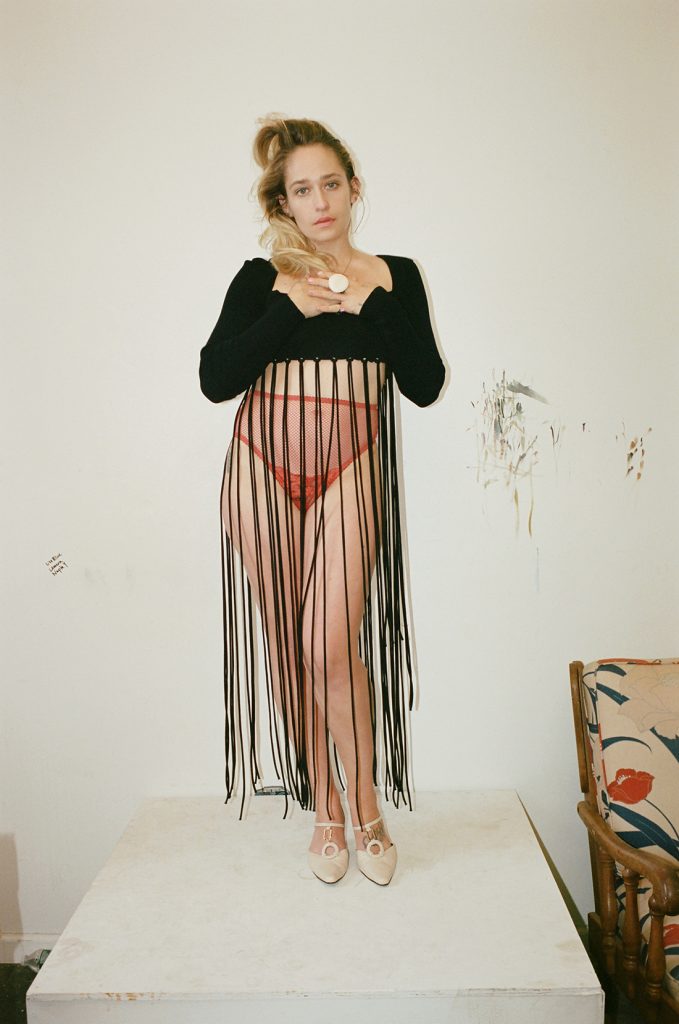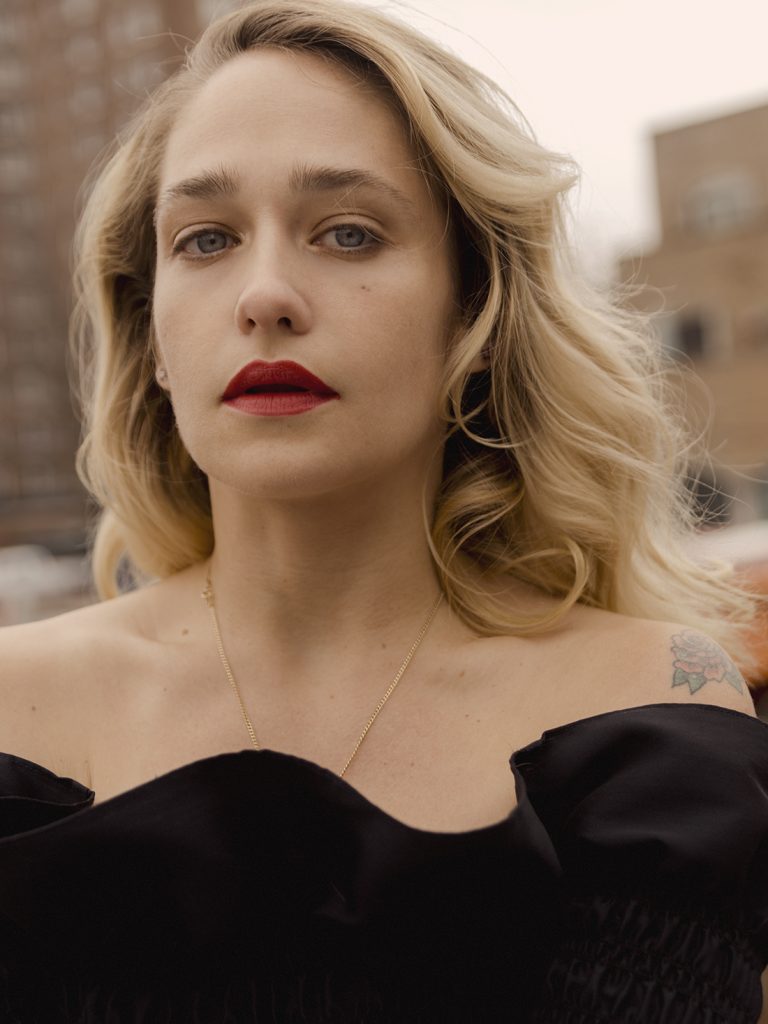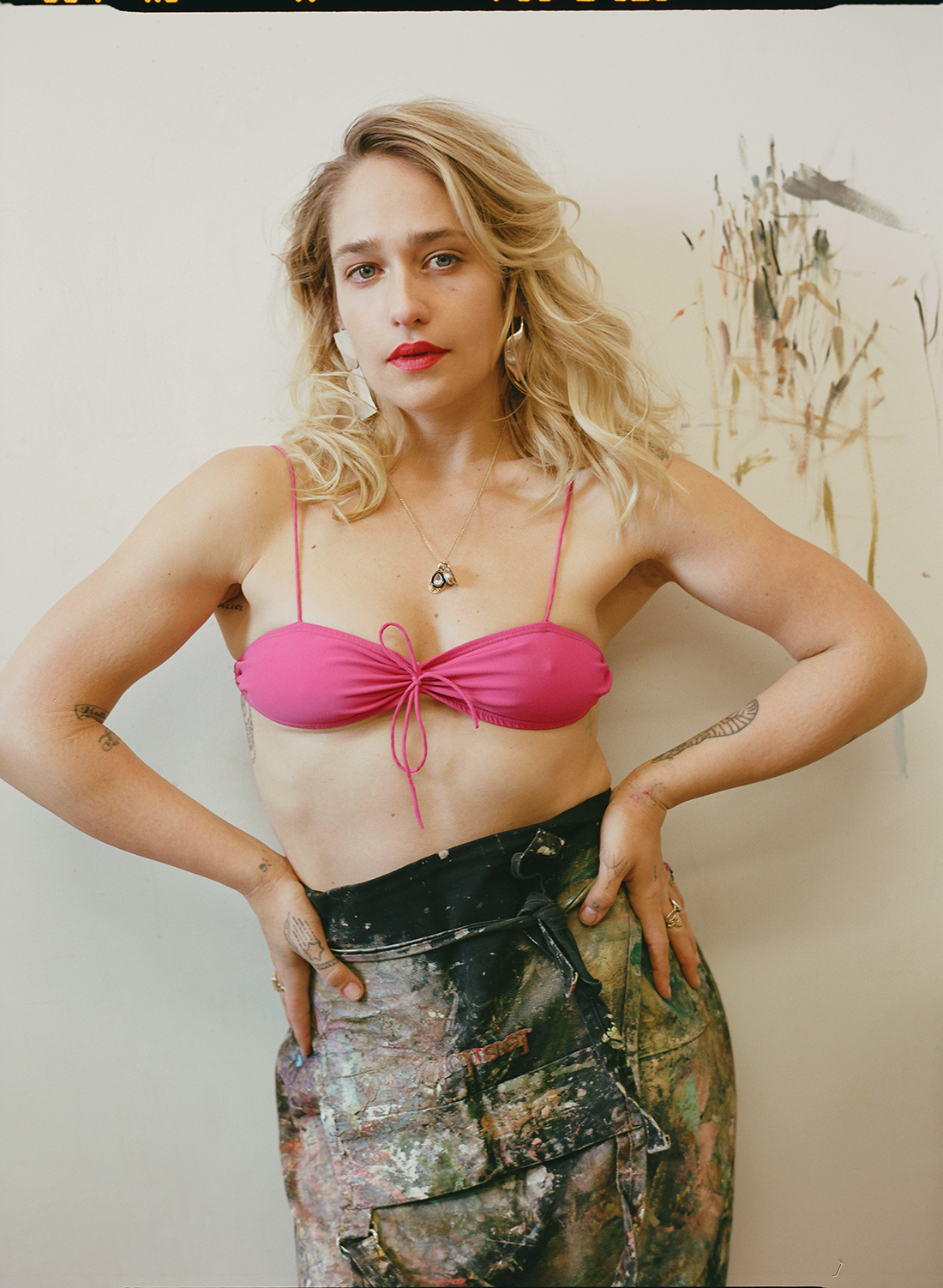The Portrait Painter
Better known for her acting, Jemima Kirke is a portrait painter at heart. It is in art she is formally educated and it was through drawing she messed with her therapist’s head as a child.
New York 31st January
When I schedule this interview with Jemima, it is mainly to talk about her art. But after she on several occasions leaves me hanging without any notice, it is tempting to associate the situation with her free spirited character Jessa on Lena Dunham’s tv-series Girls. Jessa defies the idea that time is linear and therefore, when she is two hours late for a dinner party her friend Marnie is throwing for her—and gets berated for her lateness—her response is “I thought that was just a suggestion.” Finally on Skype with Jemima, she is apologetic and charming. The way she talks about her practice is straightforward and humble. For her, it is like any other line of work and she finds it mystifying that people are drawn to paintings in the first place.
Even if she at first does not seem to be an anxious person, she talks about it openly. In her paintings, there is a tangible darkness hovering—even in her paintings of children. Often with a slouching or relaxed posture, Jemima’s portraits become hers through their accentuated details with sharp edges and shadowy eyes.
Erica: Now when you’ve ghosted me twice I can’t help but wonder if this is just a figment of my imagination.
Jemima: Yes, I’m sorry about that. My friend had a baby and I had to be there so…
Erica: But your friend and her baby is ok?
Jemima: Yes, they are. I totally forgot about multiple engagements that day, not just you.
Erica: So now when I finally have you on the line, would you mind telling me what’s alluring about painting portraits?
Jemima: It’s funny, when I first started painting portraits, I didn’t really know what to expect. But I suppose what happens is that you see what’s in front of you, and it’s not like a phone or a rock. The subject is something that moves, thinks and breathes. It’s a being. You’re trying to distill that into an object. It’s a cool process, but because of that, I never know what it’s going to be like until it’s done. What’s that process of spinning wheat into gold, what’s that called?
Erica: Do you mean alchemy?
Jemima: Yes, it’s like an alchemy. Only in reverse. Turning gold into wheat.
Erica: Is that how you see your paintings?
Jemima: No, it’s just that at the end of the day it’s just a painting against a person. That’s the reality of it. Painting is one of the most functionless things there is. Except for whatever reason, the person that bought it wants to look at it every day.

Erica: Who are your influences?
Jemima: I mean … there are many. There’s an artist called Honoré Desmond Sharrer. Milton Avery is one. Another big influence is my boyfriend Alex [Cameron]. He’s a fearless writer and I’m a very fearful painter—and fearful everything. He influences me to paint truly what I want to paint, and find what it is that I want to paint, because that isn’t always accessible to me. He knows exactly what he wants and that can be infectious.
Erica: Is he a fearless critic as well?
Jemima: Yes, he can be. He is not so much a critic of the paintings as he is off my perception of it. When I really hate something or I’m frustrated with something I’m working on, he’ll ask all the right questions to help me understand why I don’t like it.
Painting is one of the most functionless things there is
Erica: Your paintings are figurative but there’s also something abstract about them. Do you have certain details that you’re more fixated with than others?
Jemima: Yes, they are abstract. It’s not totally intentional all the time. Sometimes it’s just the matter of my skill set. I try not to be too obsessed with creating a replica of what I’m looking at. In the show I did about wedding dresses – this was two years ago – I was obsessed with the dresses and their details. This last one, with the kids, it was their hands.
Erica: Why the hands?
Jemima: You know, everyone says the eyes, the eyes, the eyes are the windows to the soul. Maybe they are, I don’t know. But I think what someone does with their hands is more telling of where they’re at and how they’re feeling in that moment, or at least it can be a very good indicator.

Erica: In terms of the experience, what’s the difference in having a child sit for you compared to an adult?
Jemima: First of all, children don’t sit. Sometimes you’ll get a weird kid who’ll just sit there and it’s amazing and a pleasure, but the difference lies in trust. The sad and beautiful thing about children is how much they trust. I find that to be quite heartbreaking. Our biggest lessons in life we learn when our trust is broken over and over again. It starts when you’re a child and then it continues throughout our lives. That’s something that draws me towards children, wanting to protect them and wanting to sort of portray that trust. Children are mostly the same: trusting, open, distracted. There’s no real judgement, no real fear. Maybe slight weariness, but that goes away quickly. It’s something that the adults don’t have when they’re sitting there. They are uncomfortable when they sit down – everyone in their own way.
Erica: What’s it like panting your own kids?
Jemima: They are jaded. Once Rafaella wanted to skip school and I said ok just for the hell of it, but with the condition that she would come to the studio and sit for me for a few hours. That was how she repaid me.
Erica: This is perhaps a taboo question, but would you say that having children limits your work?
Jemima: Yes, immensely! When you have kids, you have to work on a schedule. Artists don’t like schedules. Or we think we don’t like schedules. But artists have to think of themselves as workers just like everyone else; we have to put the hours in like everyone else. Most people work 9 to 5 and it’s helpful to think of my work in that way too, like I’m going to the office. If I didn’t do that, I’d paint all night. I love to paint at night, but I can’t be a nighttime painter with children.
artists have to think of themselves as workers just like everyone else
Erica: An artist is often seen as having a heightened profession. What’s your relationship to yourself as an artist?
Jemima: I’m not on any high horse about being an artist. If anything, I have some shame around it because it’s difficult to argue that I’m helping anyone or doing any good in the world by making art. Sometimes you start to feel like you’re spinning on your own axis, not affecting anyone else. But I also know that’s not true. We need more artists in the world because art creates beauty and without beauty, we wouldn’t have any self-reflection or happiness. Other jobs have a humility to them that I need to remind myself of, that my job is as equal to anyone else’s regardless of the function it might have.

Erica: Do you see your acting as something separate from what you do as an artist?
Jemima: It’s separate in the sense that it’s a whole different industry and a different skill set. The process isn’t super dissimilar in that I’m still thinking about what it means to be a person in this present moment. I do that in acting and I do that when I watch someone sitting in front of me. It’s still about people’s insecurities, discomforts, self-awareness, idiosyncrasies, all these things you have to take into account. How does someone behave, hold their hands, how do they do their hair, how do they say hello?
Erica: Do you think your achievements as an actress has affected your success as an artist?
Jemima: Probably, for better and worse. For better because it brings some attention to the work. For worse because you’re going to be known for the thing you make most money doing. So, for a lot of people I’ll always be the actress who paints. Which is not ideal. But, you know, it comes with a territory.
Erica: So, would you say that money is important to you?
Jemima: Yes, it is. It’s physicalised success. It represents that. You put some energy and effort in to make something and this is what you get back. This is your exchange for it and that exchange is important to me because it’s telling me that I’m doing something people want.
Erica: You were first in therapy when you were five. How come you started at such an early age?
Jemima: I don’t know. I have to ask my mother. I feel like I can’t remember anything that happened before the age of 21! But I do remember that [the therapist] let me do a lot of drawing. So, it was mostly drawing and playing. I was a very clever five-year-old so I knew how to fuck with her. Maybe she knew what I was doing, maybe she didn’t. I would do these drawings that looked a little bit off, like one drawing where I painted everyone facing away. I didn’t know what the significance of it would be, but I knew that she’d like that.
Erica: Are you still in therapy?
Jemima: Yes, definitely. I think you ought to be, if you can afford it. I think it’s a real fucking shame that not everyone can, but it should be a basic right to go to therapy once a week. Life is too difficult, and people are too miserable to not talk to someone about it.
Life is too difficult, and people are too miserable to not talk to someone about it
Erica Does working on yourself to a great extent inform your art?
Jemima: Yes. When you’re a painter you’re alone a lot and spend a lot of time in your own head. That can really guide the way your work goes. You’re at the mercy of your own emotions, which is shit. You don’t have a boss; you don’t have a spreadsheet in front of you to work on. When you’re so dependent on your mood, that’s a precarious place to be. So, to have a little control over my emotions and moods is really helpful in the studio.
Erica: In this issue, Nuda is exploring all things beyond. Would you say that you’re spiritual in any way?
Jemima: I worry that I’m not. I have a propensity to be quite negative and existential. The only spirituality I believe in is love, and that’s the only thing I’ve experienced that is close to spirituality: a genuine connection to someone. Other than that, I don’t have a practice. I don’t have any real beliefs yet. I hope that when I’m an old lady I’ll have more spirituality in my life than I have now, because it’s not easy living without it.
Erica: So, you’re not into the millennial astrology thing?
Jemima: No, but you know what they say: if you don’t believe in anything, you’ll fall for everything. That’s a little bit true for me. I’m open to all of it. I’m open to the psychics, the tarot cards, the whatever. I would love to know the answer to life. Please, if someone has it, or even thinks they have it, then I want to hear it!
This interview is accompanied by images taken by photographer Clément Pascal on the streets of NYC as well as in the studio Jemima calls “a nice little office situation.”
| Photography | Clément Pascal |
| Stylist | Leah Henken |
| Hair | Ayumi Yamamoto |
| Make-up | Rei Tajima |
| Words | Erica Lindberg |

